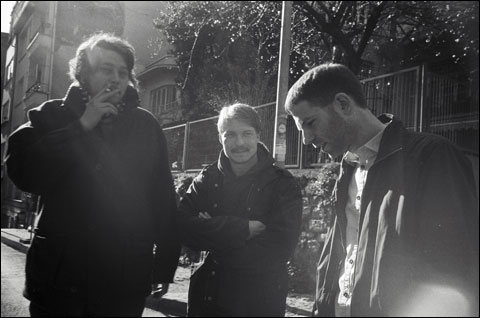
OVER-SATURATION POINT "You can see clips of any band on YouTube," laments Johan Duncanson (right). "A lot of the secrecy and excitement gets lost." |
Growing up in the small Swedish town of Björntorp, Johan Duncanson didn't have bright explosions of spray paint on underpasses to remind him that art could exist outside the lines of commercialism. Instead, music, movies, and comic books provided the language he could jump into. At a young age, Duncanson thought Neil Tennant had enough swagger to out-toast Bruce Springsteen and John Carpenter left more to the imagination than Steven Spielberg. "I think he [Carpenter] was the first auteur kind of DIY person that I had come in contact with, because I saw Halloween when I was 13," recalls Duncanson from his home in Stockholm. "I thought it was a great film, but at the same time, I could see that it was achievable to make a film like that. It was apparent to me that they didn't have a huge budget or anything. And that was extremely inspiring."
Now an adult and still a bit weird, Duncanson has found his circle. Such as Sofia Coppola, who put three of Radio Dept.'s songs in 2006's Marie Antoinette. And Johan Angergård of Swedish label Labrador Records, who showed good faith through singles, EPs, three proper albums, and a brand new compilation, Passive Aggressive: Singles 2002–2010, which drops on the eve of the band's appearance this Friday at the Middle East. Passive aggression in the candy-sensitive, humble electro-pop scope of Radio Dept.? "I guess it describes us in a way," laughs Duncanson. "I guess we've been quite hard to deal with for the label anyways."
You could think of the fertile murmurings and groggy hymns of Radio Dept. as their way of marking their territory on the pop scene before they make their getaway. Never mind their disguise as an nostalgic indie band. On their most recent proper album, 2010's Clinging to a Scheme, a sample of dialogue from the 1983 street-art documentary Style Wars pops up in the bedroom dub of "Never Follow Suit." Says one street artist, "All these other people who don't write, they're excluded. I don't care about them. They don't matter to me. It's for us." Also from Clinging to a Scheme, the jangly, almost giddy "Heaven's on Fire" samples an appropriately acerbic interview snippet from Thurston Moore: "I think we should destroy the bogus capitalist process that is destroying youth culture." It reads like a serious statement, but hearing it drop into the drum-machine-fueled track makes it smear and drip like the splash of sloganeering that it is.
Three years in the making, Clinging to a Scheme was like the creation of a capricious director who doesn't reshoot any scenes but keeps changing the story and adding new characters. Scores of songs were begun, most were left unfinished, and though the finished product took a lot longer than the label would have liked, the tracks that made the final cut were recorded very fast.